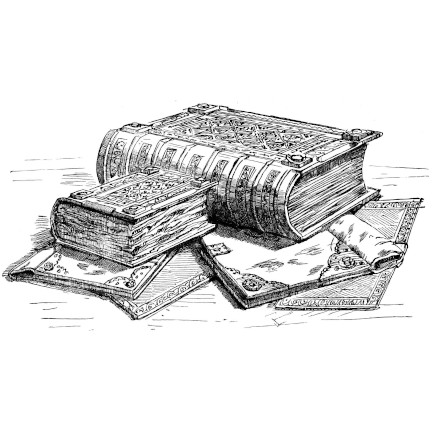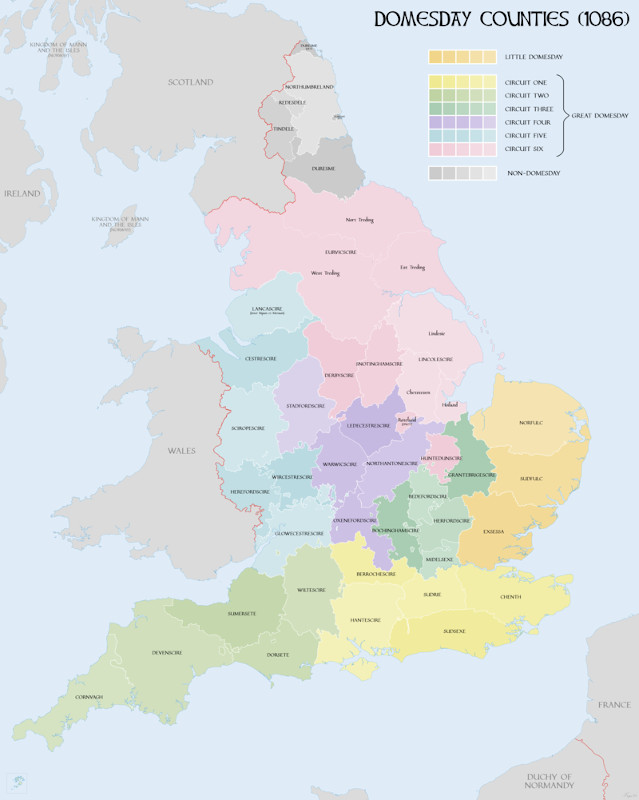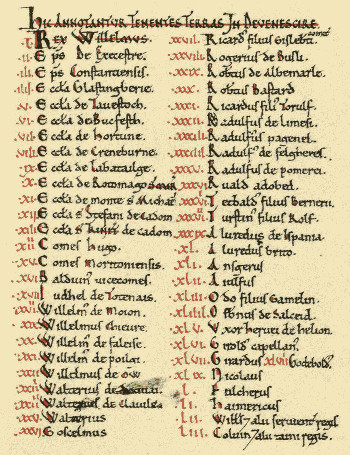Domesday Book (Book) AKA Liber de Wintonia

Domesday Book
1085 AD - 1086 AD
AKA Liber de Wintonia
A manuscript record of the "Great Survey" of much of England and parts of Wales completed in 1086 by order of King William I, known as William the Conqueror. The manuscript was originally known by the Latin name Liber de Wintonia, meaning "Book of Winchester", where it was originally kept in the royal treasury.
Written in Medieval Latin, it was highly abbreviated and included some vernacular native terms without Latin equivalents. The survey's main purpose was to record the annual value of every piece of landed property to its lord, and the resources in land, manpower, and livestock from which the value derived.
The name "Domesday Book" came into use in the 12th century. Richard FitzNeal wrote in the Dialogus de Scaccario (c. 1179) that the book was so called because its decisions were unalterable, like those of the Last Judgement, and its sentence could not be quashed.
The manuscript is held at The National Archives at Kew, London. Domesday was first printed in full in 1783; and in 2011 the Open Domesday site made the manuscript available online.
The book is an invaluable primary source for modern historians and historical economists. No survey approaching the scope and extent of Domesday Book was attempted again in Britain until the 1873 Return of Owners of Land (sometimes termed the "Modern Domesday") which presented the first complete, post-Domesday picture of the distribution of landed property in the United Kingdom.
Events (2)
for 
Attachments
Domesday Book Page 1 List of Devonshire landholders in chief, from Domesday Book, first page of King's holdings: HIC ANNOTANTUR TENENTES TERRAS IN DEVENESCIRE ("Here are noted (those) holding lands in Devonshire"). There are 53 entries, including the first entry for the king himself: I Rex Willelmus II Ep(iscopu)s de Execestre III Ep(iscopu)s Constantiensis IIII Eccl(esi)a Glastingberie V Eccl(esi)a de Tavestoch VI Eccl(esi)a de Bucfesth VII Eccl(esi)a de Hortune VIII Eccl(esi)a de Creneburne IX Eccl(esi)a de Labatailge X Eccl(esi)a de Rotomago S(ancta) Mar(ia) XI Eccl(esi)a de Monte S(ancto) Michael XII Eccl(esi)a S(ancti) Stefani de Cadom XIII Eccl(esi)a S(ancti) Trinit(atis) de Cadom XIIII Comes Hugo XV Comes Moritoniensis XVI Balduin(us) Vicecomes XVII Judhel de Totenais XVIII Willelm(us) de Moion XIX Willelmus Cievre XX Willelm(us) de Faleise XXI Willelm (us) de Poilgi XXII Willelmus de Ow XXIII Walterius de Douuai XXIIII Walterius de Clavile XXV Walterius XXVI Goscelmus XXVII Ricard(us) filius Gisleb(er)ti comitis XXVIII Rogerius de Busli XXIX Rob(er)tus de Albemarle XXX Rob(er)tus Bastard XXXI Ricardus fili(us) Torulf XXXII Radulfus de Limesi XXXIII Radulf(us) Pagenel XXXIIIIRadulf(us) de Felgheres XXXV Radulfus de Pomerei XXXVI Ruald Adobed XXXVII Tetbald(us) filius Bernerii XXXVIII Turstin(us) filius Rolf XXXIX Aluredus de Ispania XL Aluredus brito XLI Ansgerus XLII Aiulfus XLIII Odo filius Gamelin XLIIII Osb(er)nus de Salceid XLV Uxor Hervei de Helion XLVI Girold(us) capellan(anus) XLVII Girardus XLVIII Godebold(us) XLIX Nicolaus L Fulcherus LI Haimericus LII Will(elmu)s et alii servient(es) regis LIII Coluin et alii taini regis










